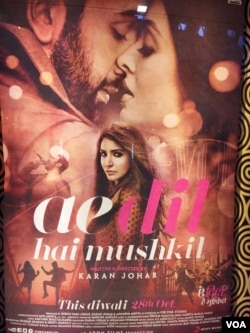The coastal city of Mumbai, where India’s popular Bollywood industry is based, is far away from the mountainous region of Kashmir, where cross border firing between the Indian and Pakistani armies has escalated in recent weeks.
Political and military tensions affect the film industry
But as Bollywood becomes the unlikely battleground where Indian and Pakistani tensions are being tested, Bollywood filmmakers have pledged not to use Pakistani talent following threats by a hardline Hindu group to disrupt the upcoming release of a film starring a Pakistani actor.
Pakistan last week banned Indian films and television shows, which have a big audience in the country.
The cultural standoff between the South Asian rivals follows the downward spiral in their relations after a militant attack on an army camp in Indian Kashmir killed 20 soldiers.
Focus on new Hindi movie
The controversy over whether artists from across the border should get space in India’s thriving entertainment industry has centered around top director Karan Johar’s romantic Hindi movie to be released this Friday, “Ae Dil Hai Mushkil” (Oh Heart, it’s difficult), in which Pakistani actor Fawad Khan, plays a role.
The film was given a green signal over the weekend by a far right political party, the Maharashtra Navnirman Sena (MNS), which had threatened to attack cinema halls screening the movie only after an industry body agreed to ban Pakistani talent in Bollywood. “In the larger interest and sentiments of the people and soldiers and entire country, we will not work with any Pakistani artistes in the future,” said Mukesh Bhatt, president of Film and Television Producers Guild of India.
Although the Indian government had earlier assured security for the film’s screening, threats of violence by MNS remained a worry for the film’s directors and producers.
Movie director pleads for open showing for film
In a video appeal last week to not let the film be blocked, director Karan Johar said he had shot the movie before when relations between the two countries were different. “I beseech you to know one thing that over 300 Indian people in my crew have put their blood, sweat and tears into my film.”
The appeal went viral and raised questions on whether Bollywood had to succumb to bullying tactics by hardliners. TV host Barkha Dutt tweeted that she was "ashamed that we as a society have bullied (Johar) into having to prove his patriotism.”
Pakistani actors and musicians, who have left India as the controversy swirls, made a debut in Bollywood after Pakistani serials became a huge hit in Indian households. Some stars such as Fawad Khan had won many fans.
Nationalism carries the day
In the days after the political tensions hit the big screen, some Bollywood heavyweights spoke up in defense of the actors. Top star Salman Khan said “Artists are not terrorists. These are two different subjects.”
But such voices were quickly swamped by nationalistic rhetoric demanding that Bollywood shut out Pakistani talent. Most of those raising that demand said they were upset that the Pakistani stars had not condemned the attack on the Indian army camp.
“If anything happens in Paris, if anything happens in America, if anything happens in London, all the Pakistani artists immediately condemn it. Why not in India?,” questioned T.P. Aggarwal, the head of the Indian Motion Pictures Association, which initially called for the ban.
Debate rages on and spreads to sports
Sporting ties have also taken a hit. Pakistan has been barred from taking part in the World Cup of kabaddi, a wrestling championship being hosted by India.
In heated television debates in recent weeks, questions have been raised: are arts and sports fair game in the ongoing political tensions between the two countries? The government’s hardline response to the militant attack was widely welcomed in India, where an angry public has demanded retaliation against terrorist strikes.
But many people in India are unhappy that the entertainment industry has become a target.
A middle-aged couple look forward to watching the film. Calling the controversy unnecessary, Deepali Kamotra said, “All this culture and artists and everything, we should rise a level above all these things.”
Her husband, Ashish Kamotra agreed. “For us it does not matter, which artist is there. There are no boundaries, for a common man like, we really don’t care,” he said.
The government has said it has no plans to stop people-to-people contact which increased hugely over the past decade and was seen as a way ahead for the rivals to reduce their mutual suspicions.
But there are fears that the present tensions have turned the clock back on a steady improvement in people-to-people, culture and sporting ties witnessed over the last decade between the two rivals.
Saying that such contacts are necessary for the two countries, former top diplomat, Lalit Mansingh, thinks the setback will be temporary.
“This media focus on Pakistani artists has been unfortunate, political parties have taken advantage of this, but the government when it did the surgical strikes made it very clear it was not against the government of Pakistan, not against the army but against the terrorists,” he said.





